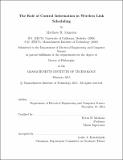| dc.contributor.advisor | Eytan H. Modiano. | en_US |
| dc.contributor.author | Johnston, Matthew R. (Matthew Ryan) | en_US |
| dc.contributor.other | Massachusetts Institute of Technology. Department of Electrical Engineering and Computer Science. | en_US |
| dc.date.accessioned | 2015-07-17T19:12:08Z | |
| dc.date.available | 2015-07-17T19:12:08Z | |
| dc.date.copyright | 2015 | en_US |
| dc.date.issued | 2015 | en_US |
| dc.identifier.uri | http://hdl.handle.net/1721.1/97758 | |
| dc.description | Thesis: Ph. D., Massachusetts Institute of Technology, Department of Electrical Engineering and Computer Science, 2015. | en_US |
| dc.description | This electronic version was submitted by the student author. The certified thesis is available in the Institute Archives and Special Collections. | en_US |
| dc.description | Cataloged from student-submitted PDF version of thesis. | en_US |
| dc.description | Includes bibliographical references (pages 241-246). | en_US |
| dc.description.abstract | In wireless networks, transmissions must be scheduled to opportunistically exploit the time-varying capacity of the wireless channels to achieve maximum throughput. These opportunistic policies require global knowledge of the current network state to schedule transmissions eciently; however, providing a controller with complete channel state information (CSI) requires signicant bandwidth. In this thesis, we investigate the impact of control information on the ability to effectively schedule transmissions. In particular, we study the tradeoff between the availability and accuracy of CSI at the scheduler and the attainable throughput. Moreover, we investigate strategies for controlling the network with limited CSI. In the first half of the thesis, we consider a multi-channel communication system in which the transmitter chooses one of M channels over which to transmit. We model the channel state using an ON/OFF Markov process. First, we consider channel prob- ing policies, in which the transmitter probes a channel to learn its state, and uses the CSI obtained from channel probes to make a scheduling decision. We investigate the optimal channel probing strategies and characterize the tradeoff between probing frequency and throughput. Furthermore, we characterize a fundamental limit on the rate at which CSI must be conveyed to the transmitter in order to meet a constraint on expected throughput. In particular, we develop a novel formulation of the op- portunistic scheduling problem as a causal rate distortion optimization of a Markov source. The second half of this thesis considers scheduling policies under delayed CSI, re- sulting from the transmission and propagation delays inherent in conveying CSI across the network. By accounting for these delays as they relate to the network topology, we revisit the comparison between centralized and distributed scheduling, showing that there exist conditions under which distributed scheduling outperforms the optimal centralized policy. Additionally, we illustrate that the location of a centralized controller impacts the achievable throughput. We propose a dynamic controller placement framework, in which the controller is repositioned using delayed queue length information (QLI). We characterize the throughput region under all such policies, and propose a throughput-optimal joint controller placement and scheduling policy using delayed CSI and QLI. | en_US |
| dc.description.statementofresponsibility | by Matthew R. Johnston. | en_US |
| dc.format.extent | 246 pages | en_US |
| dc.language.iso | eng | en_US |
| dc.publisher | Massachusetts Institute of Technology | en_US |
| dc.rights | M.I.T. theses are protected by copyright. They may be viewed from this source for any purpose, but reproduction or distribution in any format is prohibited without written permission. See provided URL for inquiries about permission. | en_US |
| dc.rights.uri | http://dspace.mit.edu/handle/1721.1/7582 | en_US |
| dc.subject | Electrical Engineering and Computer Science. | en_US |
| dc.title | The role of control information in wireless link scheduling | en_US |
| dc.type | Thesis | en_US |
| dc.description.degree | Ph. D. | en_US |
| dc.contributor.department | Massachusetts Institute of Technology. Department of Electrical Engineering and Computer Science | |
| dc.identifier.oclc | 912294935 | en_US |
